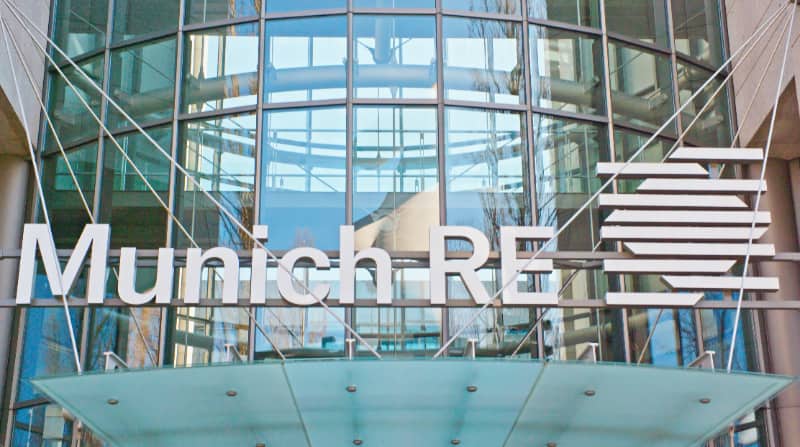Munich Re ‘well on track’ to reach annual target with H1’25 result of €3.2bn
- October 21, 2025
- Posted by: Luke Gallin
- Category: Insurance

Munich Re, one of Europe’s big four reinsurers, has confirmed its record-breaking profit of €2.1 billion for the second quarter of 2025, although for the first half of the year profit fell 15% to a still strong €3.2 billion, as the firm reports a 3.2% decrease in the volume of business at the July 1st, 2025, renewals.
For the quarter, Munich Re generated insurance revenue from insurance contracts issued of €14.8 billion, down slightly on the prior year’s €14.9 billion, attributable to negative foreign exchange effects. However, for H1’25, insurance revenue increased to €30.6 billion from €30 billion in H1’24.
Group-wide, the total technical result increased 24% to more than €3 billion, as the currency result fell to -€602 million, mainly as a result of foreign exchange losses in connection with the weak US dollar, notes the firm.
For Q2’25, the operating result amounted to €2.9 billion compared with €2.2 billion in Q2’24, and the effective tax rate increased year-on-year to 27.2%.
The annualised return on equity (RoE) amounted to 25.5% in Q2’25 compared with 20.2% in Q2’24, but declined to 19.7% from 24.1% in H1.
Both the reinsurance segment and ERGO, Munich Re’s primary insurance arm, performed well in the quarter and six month period.
During Q2’25, the reinsurance business contributed €1.8 billion to the Group’s net result, an improvement on the prior year’s €1.4 billion, and the H1’25 result was €2.7 billion, down on H1’24’s €3.2 billion. Insurance revenue from insurance contracts issued decreased to €9.6 billion from €9.9 billion in the quarter, and the total technical result increased 25% year-on-year to €2.4 billion, while the operating result rose 39% to €2.6 billion.
Within reinsurance, Munich Re’s property and casualty (P&C) business posted a net result of €1.2 billion, an almost 100% increase on the prior year’s €771 million. The segment’s insurance revenue from insurance contracts issued declined 7% to €4.5 billion, as the combined ratio strengthened to 61% from 73.7%, with a normalised combined ratio of 79.6%.
The second quarter was favourable for Munich Re in terms of major loss costs, which amounted to -€87 million, after retrocession and before tax, compared with losses of €644 million in Q2’24. Munich Re attributes the decline to low major-loss expenditure and the release of claims reserves from previous years. In fact, major-loss costs corresponded to -2% of net insurance revenue, so below the expected value of 17%. In terms of man-made losses, Munich Re posted a release of €107 million in Q2’25, compared to costs of €106 million in Q2’24. Major loss expenditure from natural catastrophes declined significantly year-on-year, to €20 million from €539 million in Q2’24.
Turning to life and health (L&H) reinsurance, the total technical result decreased 46% to €305 million in Q2’25. The reinsurer highlights the “ongoing very good operational performance” of the business, although the impact of a random accumulation of individual major losses in Q2, pushed the result down to €344 million from €514 million. L&H insurance revenue from insurance contracts issued increased 5% year-on-year to €3.1 billion.
In its results announcement, the reinsurer also provides an update on the outcome of the July reinsurance renewals, revealing that the volume of business fell by 3.2% to €3.2 billion, as the firm chose to not renew or write business that did not meet expectations with respect to prices, terms and conditions. Across the business renewed, Munich Re saw a price drop of 2.5%, but notes that a good price level for the portfolio was maintained overall. Over the January, April, and Mid-year 2025 renewals, Munich Re’s reinsurance portfolio experienced a 1.2% decline in prices.
“For the next round of renewals in January, Munich Re expects to see a market environment that continues to offer attractive business opportunities,” says the firm.
Turning to Global Specialty Insurance, which since Q1’25 is presented as a separate reinsurance segment, the net result increased to €296 million in Q2’25 from €54 million a year earlier, as insurance revenue from insurance contracts issued was relatively flat at €2.02 billion, and the combined ratio strengthened to 77.9% from 93.6%.
At ERGO, the primary insurance arm, the result came down slightly to €251 million from €262 million in Q2’25, and increased to €492 million from €488 million in H1’25. Insurance revenue from insurance contracts issued totalled €5.2 billion in Q2’25 compared with €5.1 billion in Q2’24, and hit €10.7 billion in H1’25, up from €10.3 billion in H1’24.
On the asset side of the balance sheet, Munich Re’s investment result increased to €2.2 billion in Q2’25 from €1.5 billion in Q2’24, with regular income from investments flat year-on-year at €2.2 billion.
Joachim Wenning, Chair of the Board of Management, commented: “In the second quarter, Munich Re posted a record-breaking profit of €2.1bn. With a half-year net result of €3.2bn, we are well on track to reach our annual target of €6bn. All lines of business contributed to the quarterly result – with excellent combined ratios in property-casualty reinsurance and GSI, and pleasing developments in life and health reinsurance, at ERGO and in our investment business. This also allowed us to mitigate the impact of foreign exchange losses due to the faltering US dollar. As the outcomes of the July renewals show, we continue to enjoy an attractive market environment. Our task now is to continue capitalising on it through stringent discipline.”
Looking ahead, Munich Re says that it is “anticipating sustained advantageous business opportunities in coming quarters,” and therefore continues to expect a net result of €6 billion for 2025. However, as a result of business and exchange rate developments, insurance revenue in reinsurance is now expected to total €40 billion, down from the previous €42 billion, with the Group’s insurance revenue now expected to be €62 billion, down from the previous €64 billion.



